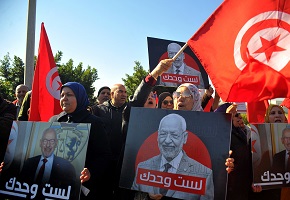As wars, repression, and social upheavals continue to reshape the Middle East, philosopher Elizabeth Suzanne Kassab of the Doha Institute for Graduate Studies argues that the region’s dominant intellectual traditions failed to grasp the needs and priorities of the societies they sought to interpret. For decades, leading Arab thinkers focused on questions of identity and heritage while citizens were confronting repression, economic hardship, and crumbling political structures. The 2011 uprisings exposed how wide this gap had grown—and the devastation of Gaza, Kassab warns, has made it impossible to ignore.
Analyses
Middle East and North Africa
- Idriss Jebari 2 December 2025For those who teach Arab intellectual history in Western universities, the Arab Spring has hung over the curriculum like the sword of Damocles. What meaning should we ascribe to this event? Does it follow logically from the previous episodes, their ideological themes, and intellectual figures? Or was it a revolutionary break of such magnitude that it risks rendering the whole course obsolete? In the age of “learning aims,” “real-world relevance,” and course evaluations, instructors have had to take a position, despite the ongoing and unresolved nature of the Arab Spring. Some disciplines, such as MENA politics, may have clearer ways of drawing conclusions about its repercussions. What of the Arab intellectual scene?
- Sari Hanafi 1 December 2025I read Elizabeth Suzanne Kassab’s essay with great interest, as well as Mohammed Hashas’s thoughtful response. Kassab rightly calls for the emergence of a new contemporary Arab thought—one less culturalist and more attuned to people’s demands for freedom, dignity, accountability of rulers, and social justice.
- Mohammed Hashas 27 November 2025When the “Arab Spring” erupted in December 2010, its aspirations were ambitious: liberty, dignity, and social justice. But the democratic backlash in Tunisia, the coup d’état in Egypt, and civil wars in Syria, Libya, Yemen, and more recently Sudan, have left little doubt that the Spring devolved into a nightmare, a failure of what began as pacifist demonstrations for change. The Arab monarchies and emirates, meanwhile, absorbed the protests quickly through a mix of measures, from modest constitutional reforms to expanded subsidies for the unemployed and the poor.
- Harald Viersen 21 November 2025In her recent contribution to Reset DOC, Elizabeth Suzanne Kassab echoes this sentiment, as she sketches an ambitious and important project to map the changes that the last decade and a half of upheaval in the Arab world has wrought in the intellectual scene. She describes what has been brewing in these circles as “new contemporary” Arab thought, contrasting it to the merely contemporary thought of the period between the 1960s and the beginnings of the Arab Spring in 2011 that she chronicled earlier in her comprehensive survey published in 2010.
- Elizabeth Suzanne Kassab 12 November 2025Undoubtedly, 2011 was a turning point in the history of the Arab region. The 2011 popular uprisings in Tunisia, Egypt, Yemen, Sudan, Libya, Syria, and, to a lesser extent, Morocco, were followed by another wave of such uprisings in Algeria, Iraq, and Lebanon in 2019. The genocidal war raging in Gaza since 2023 has taken the region to a yet deeper abyss in existential, moral, political, and economic terms. How have thinkers of the region been interacting with these upheavals? How have these dramatic events impacted the intellectual scene of the region?
- Gianni Del Panta 25 September 2025Alaa Abd al-Fattah, one of the most iconic figures of Egypt’s 2011 revolution and the country’s most prominent political prisoner under President al-Sisi, was released last Monday, September 22, by presidential decree. The news, confirmed by family lawyer and former presidential candidate Khaled Ali, was met with jubilation among relatives and political activists alike. Alaa’s sister, longtime activist Mona Seif, posted a brief message on X: “My heart is about to stop.” Their mother, Laila Soueif—who had waged a prolonged hunger strike that left her in fragile health and sparked fears for her life—reacted from her home in Giza, where she sat beside her son, surrounded by family and friends. Alongside her joy, she insisted the struggle would not be over until Egypt is free of political prisoners.
- Federica Zoja 18 September 2025Ramla Dahmani is the sister of Tunisian political commentator, journalist, and lawyer Sonia Dahmani, who is currently imprisoned in her country for allegedly spreading false information. Ramla herself, speaking out from a secret location in Europe to defend her sister and draw international attention to her case, has also been sentenced to prison. The ruling, issued in absentia on July 1, came to light only by chance, when her lawyers—having received no formal notification—stumbled upon it in judicial records. Otherwise, Ramla would have faced an unexpected arrest and imprisonment upon any return trip to Tunisia.
- Pasquale Ferrara 10 September 2025The connection between religion and violence has long been seen as a political and sociological certainty. In recent decades, particularly after the 1979 Iranian Islamic Revolution and the September 11, 2001 attacks, religions have returned to the center of the international political stage, and not always for the right reasons. Examples abound: conflicts in Bosnia, Algeria, Kashmir, Palestine, and Sudan; as well as violent Islamism, Hindu nationalism, the Christian Evangelical right, and extremist Jewish parties. The return of religion to international politics has been linked to the broader theme of identity politics. Religions have often been considered an emblematic case of the encroachment of irrationality into international security.
-











